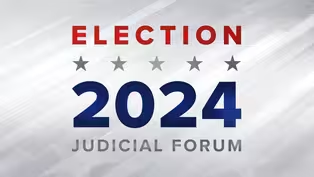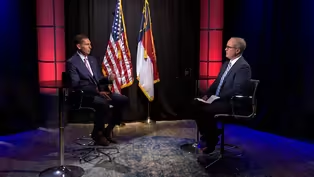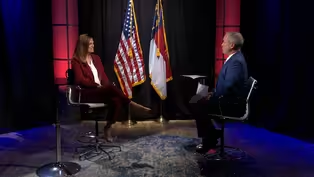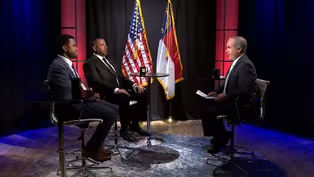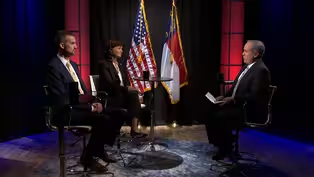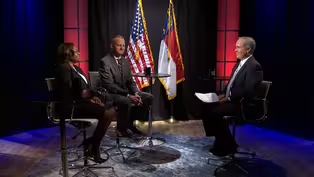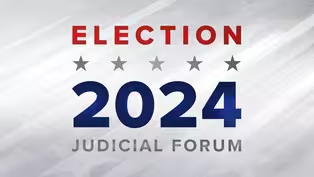
2024 NC Court of Appeals Seats 12 & 14 Candidates
Season 2024 Episode 1 | 26m 46sVideo has Closed Captions
Seat 12: Thomas Murry (R) & Carolyn J. Thompson (D). Seat 14: Ed Eldred (D) & Valerie Zachary (R).
Candidates for NC Court of Appeals seat 12 (Thomas Murry, Republican; Carolyn Jennings Thompson, Democrat) and seat 14 (Ed Eldred, Democrat; Valerie Zachary, Republican) discuss their background and why they’re running with PBS NC’s Kelly McCullen. These interviews are a partnership with the NC Bar Association.
Problems playing video? | Closed Captioning Feedback
Problems playing video? | Closed Captioning Feedback
Election is a local public television program presented by PBS NC
The 2024 Judicial Candidates Forum is made possible by a partnership between PBS North Carolina and the North Carolina Bar Association.

2024 NC Court of Appeals Seats 12 & 14 Candidates
Season 2024 Episode 1 | 26m 46sVideo has Closed Captions
Candidates for NC Court of Appeals seat 12 (Thomas Murry, Republican; Carolyn Jennings Thompson, Democrat) and seat 14 (Ed Eldred, Democrat; Valerie Zachary, Republican) discuss their background and why they’re running with PBS NC’s Kelly McCullen. These interviews are a partnership with the NC Bar Association.
Problems playing video? | Closed Captioning Feedback
How to Watch Election
Election is available to stream on pbs.org and the free PBS App, available on iPhone, Apple TV, Android TV, Android smartphones, Amazon Fire TV, Amazon Fire Tablet, Roku, Samsung Smart TV, and Vizio.
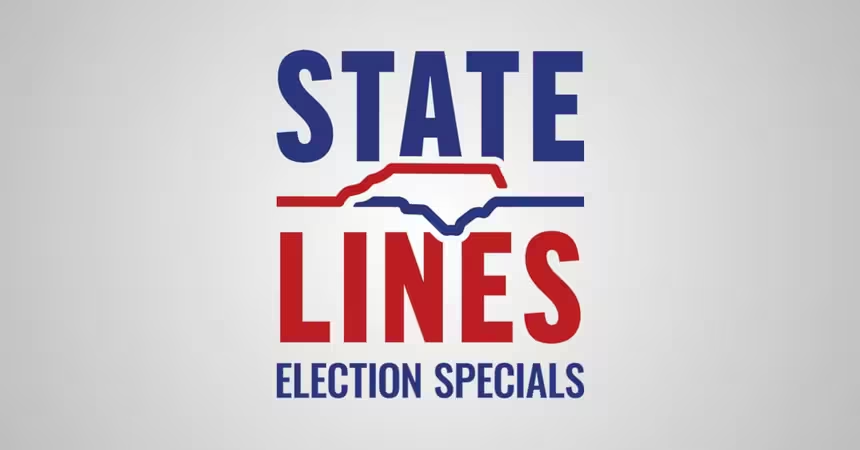
Council of State Candidate Interviews
During major election cycles, State Lines host Kelly McCullen sits down for in-depth conversations with candidates running for Governor and Council of State positions.Providing Support for PBS.org
Learn Moreabout PBS online sponsorshipMore from This Collection
2024 NC Judicial Forum
2024 NC Court of Appeals Seat 15 & Supreme Court Seat Candidates
Video has Closed Captions
St. 15: Chris Freeman (R) & Martin Moore (D). Supreme C.: Jefferson Griffin (R) & Allison Riggs (D). (26m 46s)
NC Supreme Court Candidate Jefferson Griffin (R)
Video has Closed Captions
NC Supreme Court candidate Jefferson Griffin (R) discusses the position. (6m 43s)
NC Supreme Court Candidate Allison Riggs (D)
Video has Closed Captions
NC Supreme Court candidate Allison Riggs (D) discusses the position. (6m 41s)
NC Court of Appeals Seat 15: Chris Freeman (R) & Martin Moore (D)
Video has Closed Captions
NC Court of Appeals seat 15 candidates Chris Freeman (R) & Martin Moore (D) discuss the position. (12m 59s)
NC Court of Appeals Seat 14: Ed Eldred (D) & Valerie Zachary (R)
Video has Closed Captions
NC Court of Appeals seat 14 candidates Ed Eldred (D) & Valerie Zachary (R) discuss the position. (12m 20s)
NC Court of Appeals Seat 12: Tom Murry (R) & Carolyn J. Thompson (D)
Video has Closed Captions
NC Court of Appeals seat 12 candidates Tom Murry (R) & Carolyn J. Thompson (D) discuss the position. (12m 56s)
Providing Support for PBS.org
Learn Moreabout PBS online sponsorship- Meet the Republican and Democratic nominees for North Carolina Court of Appeals Seats 12 and 14 next.
The 2024 Judicial Candidates Forum is made possible by a partnership between PBS North Carolina and the North Carolina Bar Association.
[bright, rousing music] Joining us are the nominees for North Carolina's Court of Appeals Seat number 12 as it's called, Democratic candidate Carolyn Jennings Thompson and Republican candidate Thomas Murry.
Hello to both of you.
Thank you for taking time out of your busy schedule.
- Thank you.
- Glad to be here.
- We flipped a coin in the green room to determine who would speak first and who would have closing arguments and by virtue of the coin flip, Ms. Thompson, the incumbent, you will go first.
Tell us about yourself, why you're running, your background, and we'll take it from there.
- Well first, thank you so much for this opportunity to educate the voters about the candidates for the seat.
I am Carolyn Thompson.
I currently serve the state on the North Carolina Court of Appeals.
But just to give you some background, I was born and raised in a rural town by parents who instilled in me very early the importance of hard work and earning my way and the importance of understanding that to whom much is given, much is required.
And I think that has contributed so much to my 27 years of experience and also the fight to continue to stay in the judicial system where it impacts lives and generations to come.
27 years prior being a district court judge, superior court judge, serving on the Industrial Commission as a deputy commissioner, trial attorney for 13 years before becoming a judicial official for the state.
I'm a mom, my First Sergeant John Thompson and I have a blended family of five adult kids and I hold honor to being called nana to six beautiful grandchildren and we finally got our boy Jeremiah, he's 18 months old and I look forward to continuing to answer your questions and educate our voters.
- Well, thank you for being here.
Mr. Murry, tell us about yourself.
- Well, over the past 23 years, I've had the opportunity to help folks in many different capacities.
I started my career as a local community pharmacist.
I worked with a lot of small business pharmacy owners and that led me to law school with all the different regulatory issues.
And during law school, I got asked by folks in my neighborhood to run for my town council.
And so I ran for the town council, got elected when I was 28 years old, had a 1-year-old in a stroller asking people to vote for me.
After getting reelected, I got asked to run for the state legislature, served a couple terms in the legislature.
While I was in the legislature, I joined the Army National Guard as a 37-year-old father of three, with my youngest being six months old.
After leaving the legislature, I had the opportunity to serve our Chief Justice as chief legal counsel.
Worked for the Chief Justice where we did dramatic reforms on juvenile justice issues.
While I was in that row, I deployed to the Middle East where I got a chance to see what lawlessness and disorder and chaos looks in foreign countries that have never slept under the blanket of peace that we've enjoyed our entire lives as Americans.
And after coming back from that deployment, I decided to go back into the trenches as a state prosecutor where I've enjoyed working with local law enforcement on keeping our communities safe.
And I'm running for the court of appeals because I believe I've got the right balance of public and private sector experience that would benefit the Court of Appeals.
- Ms. Thompson, if you had to name the most important qualification, or a few, of any judge who serves on our Court of Appeals, what would those qualifications be?
- Certainly the first thing that comes to mind is integrity.
That people can trust what you say and what you write in an opinion.
And that understanding that there's a transparency need for our court system so folks are not questioning what exactly is a judge and why should we vote for judges.
I think it's important that we hold true to our oath, that we will uphold the Constitution and our laws of our state not inconsistent with those of our United States Constitution.
When you speak this truth to the community, to the public, I think people should be able to count on and trust that this judge is gonna do the right thing.
- When you look back at your own professional and personal background, what parts of your experience do you think have really prepared you to serve on the Court of Appeals?
- Well, certainly being a trial attorney for 13 years before becoming a judge for 10 years.
Because the first thing I do when I get the record, I look at what happened in the lower courts.
And having that benefit of being there as a trial attorney, as a trial judge, I can understand where the court process was in that moment.
Before I look at any briefs, you know, the briefs come into us to kind of persuade the judges to rule one way or another.
I take the position that it's important to look at the record first, which prepared me to this place.
- Mr. Murry, qualifications for you, in the general sense, not including yourself, including everyone who serves on the Court of Appeals as you view it, what are the most important qualifications to take to that role?
- The Court of Appeals handles a myriad of cases, but half the cases that come to the Court of Appeals are criminal conviction appeals.
And as a state prosecutor, my advocacy has been affirmed by the Court of Appeals.
And so I think the experience as a state prosecutor has definitely benefited me.
Trying cases in front of juries, working with local law enforcement on public safety issues is a big part of the importance of the Court of Appeals.
But I'll say, I truly believe that the Court of Appeals is just an error correcting court, not a policy court.
And so knowing your lane and understanding the role that the judiciary plays in our separation of powers, and I think the judiciary staying independent, being an independent branch of government and restraining our opinions to the issues presented before us is extremely important when you're looking at judicial candidates.
We don't need that are gonna legislate from the bench, we need folks that are gonna defend the Constitution.
As a soldier, I've taken an oath of office to uphold that Constitution.
Camouflage does not say I'm a Republican or a Democrat.
And so those values that are instilled in me as a soldier and as a state prosecutor, I believe are key to making sure that the judiciary remains independent and stays in its lane.
- What are your thoughts about independence of the judiciary in this era where we can look on the ballot and see who's a Democrat, who's a Republican?
- Well, quite frankly, it's an unfortunate thing that we have to run in partisan races.
I don't get a blue file, I don't get a red file, I get people's issues.
And because this is often the court of last resort, we are the workhorse of the appellate system.
We get about 90% of the appeals that come from the lower courts.
I don't look at a file and say, "I wonder if they're a Republican, I wonder if they're a Democrat."
If we could just get back to a place where people can trust the judges by seeing the work and having that proven record.
I've already authored over 96 opinions in less than a year that impact the entire state.
You should be able to look at a judge's record to see exactly where they stand about upholding the law and the Constitution.
It's not about partisan.
It should not be partisan.
It should in fact be independent.
- From being in that seat, do you feel the pressure of legislators, of attorney generals and other elected leaders coming down on the court?
'Cause you do see it sometimes, Supreme Courts and Courts of Appeals, they are referenced and they do make the headlines whether they ask for it or not.
- Well, you have to stay focused.
You stay focused on the job.
And the job is what the people, this is not my seat.
This is a seat that belongs to the people.
The people are expecting me to uphold the law fairly, equally.
It doesn't matter where you come from, where your zip code is, what your zip code is, or your race or nationality or your belief system.
It has to be about upholding equally.
You can't have that expectation from the court, then that's where we are getting into the lane of people not trusting our judicial system as much as they used to.
- Mr. Murry, you come with experience from the General Assembly and you see how the tone is in Raleigh right now, the way people like to do business on both sides of the aisle.
Go a little deeper into that.
How much independence should we expect if people are voting on a partisan basis from a judge?
- Well, I can tell you that the judiciary is an independent branch of government separate from the executive and legislative branches.
I have the fortunate experience of serving in the legislature where I overrode vetoes by Democrat governors and I overrode vetoes by a Republican governor.
And so I think when you look at the issue set and you look at the facts of the case, equal protection under the law means same facts, same law, same outcome.
And that has nothing to do with a partisan bent on any particular issue.
And I can tell you, when judges issue rulings based on their partisan leanings, public trust is undermined.
And I think the independence of the judiciary is something that I learned when I worked for the Chief Justice and we had a myriad of cases that dealt with separation of powers issues, many of which pitted a Republican governor against the Republican legislature.
And I think that's the perfect role for the judiciary, is to see the call the issues out based on the Constitution and the plain meaning of the statute.
And that's our role as judges.
- How can a voter know?
They elect judges here and there on different statewide ballots, but how do they know when their Court of Appeals is working most effectively, Ms. Thompson?
- I think reviewing the record is where they will find if we are working effectively.
You can see in recent days what we are doing with things like the voter issue and the RFK ruling.
We are point on, we have our pulse on what's happening in the communities and within the state.
People who are engaged and informed and understand the importance of judges will look at the history, the proven record of where the judges stand.
- On that point, how do you see the Court of Appeals working most effectively in this last minute before we get to closing statements?
- Certainly, I think the most effective thing that the Court of Appeals can do is issue its decisions in a timely manner.
And I think that there should be strict timelines.
We have strict timelines on litigants and I think the timelines should be strictly enforced on the judges, the panel of judges that sit, they sit in three judge panels.
We need to issue those opinions in a timely manner so that the public gets the result.
And justice delayed is justice denied.
And I've seen some delays at the Court of Appeals and I think we can improve the time from oral argument to decision.
- This is a very interesting set of interviews because it's unique for me in that we are in an interview format, but we also have opening and closing statements and we opened this interview, we'll now close 'em with closing statements.
And by virtue of the coin toss, Mr. Murry, you'll have the last word, so you'll have 60 seconds.
Tell us about why you're seeking office and why folks should vote for you.
- Well, I'm seeking to retain the seat because I'm already there doing the hard work for North Carolina.
It's a lot to say about the 27 years of experience of being a trial attorney, a trial judge, and also now holding the seat, doing the work.
Just to kind of piggyback on what Mr. Murry mentioned, we are a hardworking group of judges.
We are 15, we sit in panels of three.
We are turning cases out, but it's expediency over effectiveness, no.
We're not gonna quickly get to a resolution because of a timeline, we must make sure that we're making the right decisions and having the right outcome in every single case.
And speaking of right, I believe that in this race, I have the right experience to continue to serve the state of North Carolina and would appreciate the support.
- Alright, thank you Ms. Thompson.
Mr. Murry, the last minute is yours.
- Thank you, sir.
I really appreciate the North Carolina Bar Association and UNCT for hosting this.
My name's Tom Murry, I'm running for the North Carolina Court of Appeals Seat 12 and I'm asking for your vote for very simple reasons.
As a state prosecutor, as an army veteran, as a husband and father of three, I think I've got the right balance of experience starting as a local community pharmacist and bringing that healthcare background to the Court of Appeals where a lot of issues are decided that involve medical issues.
I think I've got the right background experience and I'd ask that you support me because local law enforcement is supporting me.
I've been endorsed by two different police organizations that know that I will bring the right skillset to the Court of Appeals to keep our community safe and defend the Constitution.
- This is Carolyn Thompson, the Democrat incumbent running for the Court of Appeals Seat 12, challenger Tom Murry from the GOP side.
Thank you so much for your time in this interview and to inform our viewers because people do care about their judges and who serves on their courts.
In person early voting begins October 17th, 2024 and ends on November 2nd, 2024.
Election day is November 5th, 2024.
It would also be the deadline for any absentee ballots to be received by elections officials and all voters will be asked to present a photo identification.
Joining me now on the set are the nominees for North Carolina's Court of Appeals Seat 14, Democratic candidate Ed Eldred and Republican candidate Valerie Zachary.
Hello to you both.
Thanks for being on the set.
- Hello.
Thanks for having me.
- Hello.
- For a very intimate conversation.
- Glad to be here.
- I'm glad to have you here too and it's great for you to both agree to appear together on behalf of the voters of North Carolina.
So this is an interview that has opening and closing statements, so not quite a debate, so voters can get to know you.
We flipped a coin backstage that led us to Mr. Eldred, you saying you wanted the opening comments because you won that coin flip so we'll give it to you up to two minutes.
Tell us who you are and why you're running.
- Sure, thanks for having me and to you personally, I know you've been doing these for some time now.
You do a great job and very conversationalist as you say.
So I grew up here, I was raised here.
I went to North Carolina Public Schools.
I went to UNC for my undergraduate degree in history and English.
And then I went to UNC for law school where I graduated with honors.
After that, I clerked for two judges at the Court of Appeals.
I clerked for Linda Stevens for two years and then for Chief Judge John Martin for about six months before moving to a large firm in Raleigh where I worked in the appellate practice group with former Judge K. Eddie Greene.
So I've literally, I feel like, learned from the best judges that we've had on our bench.
After that, I opened up my own practice in Carrboro where I'm from, where I raise my daughter with my wife and I in fact focused on two main practice areas.
I represent parents in DSS court.
These are mothers, fathers fighting for their children, fighting to keep their families together, and I do appeals.
I've represented about 300 people in the Court of Appeals.
On the criminal side, everything from a simple possession charge to a first degree murder.
On the civil side, everything from a homeowner's association dispute to domestic violence cases to termination of parental rights, which we call the civil death penalty.
So that's what I've been doing for 15 years now.
- Thank you Mr. Eldred.
Valerie Zachary, tell us about yourself.
Two minute opening statement.
- Well, first of all, I want to thank UNCTV and the North Carolina Bar Association for collaborating and bringing this judicial forum to the voters.
I think we can all agree that it's important for the voters to have as much information as possible.
I'm Valerie Zachary from the North Carolina Court of Appeals where I've been honored to serve for over nine years now.
I'm from Yadkin County, which is in the western part of the state on the way to Boone.
And my father is from Yadkin County and my mother's from Ann Arbor, Michigan.
And they met and married in Michigan and he brought her back to Yadkin County and they had five children.
I'm the oldest of the five.
But then when I was seven, he left so my mother ended up raising the five of us by herself.
I grew up in Yadkin County and then went to half of junior high and high school in Ann Arbor, Michigan.
I received a scholarship to Michigan State University where I graduated with honors in the multidisciplinary program with concentrations in French, economics, and political science.
I then went to Harvard Law School where I graduated cum laude and served as a research assistant and critiqued moot court briefs while I was there.
I knew I did not wanna go to Wall Street, so I made a rule that I wasn't interviewing with any law firms that had a shower, their own shower 'cause I wasn't moving in.
So I took a job on the litigation team with Kennedy Covington Lobdell & Hickman, which is a Charlotte firm and is now K&L Gates.
I loved it there and it was great, but then I married my husband and ended up right back in Yadkin County again where we practiced together for 26 years.
I was appointed to the court in 2015.
I ran in 2016 and won my race.
Won an eight year term.
And it's been my honor to serve on the court since then.
- Alright, well, let's go to the first question and thank you for your opening statements.
But Mr. Eldred, what do you think, regardless of who sits in the Court of Appeals in one of those chairs, one of those seats, what are the most important qualifications any judge should have for that role independent of political party?
- Sure.
I got asked this question just yesterday.
I ran into somebody who asked me the same thing and I said, "Well, when I go into a courtroom, what I want to know is that the judge is listening to me, the judge is hearing my arguments, the judge is considering my arguments, the judge is taking my arguments seriously, trying to come to a well-reasoned and a balanced fair decision."
That's number one.
It's the opportunity to be heard.
That's I think, an overlooked quality that judges need to have.
- What about your own personal qualities that you see in yourself makes you, you know, how are they reflected in your background if you were to be elected?
- Well, representing parents in DSS court really is the most personally and professionally gratifying thing that I do.
I like to help people.
I like to stand up and fight what I think is not the most fair system around.
And the people that I'm helping need a lot of help.
It's very rewarding to have them come back to me at the end of a case and give me a hug and say, "Thank you Mr. Eldred, I really appreciate it."
And I said, "Well, I didn't do anything.
You did all the work.
I'm just holding your hand through it."
So to me, that's what being a lawyer's about.
- Ms. Zachary, I'll ask you the same question.
You sat in one of those seats.
What are some important qualifications as a person and a professional, independent of political party?
- Well, I think the most important qualities that you need to be any type of judge is to, you know, integrity, ability to do the work, and a strong work ethic, especially if you're gonna be on the Court of Appeals, because we have a tremendous workload.
And so you may be the smartest person around and you may be a tremendous person, but if you won't do the work, there are people out there waiting for their answers.
- What about your background, in your opinion, manifest into those kind of qualities that make a quality judge?
You've worked in the big city, you've also worked in rural North Carolina practicing law.
- Well, even considering my personal background, I learned that, my mother always says as the oldest of five, I was insisting upon fairness.
And then I learned the value of hard work.
You weren't gonna achieve anything without working hard.
And so I've always been a very hard worker.
And then on top of that, I have all these years of experience that I bring to the table at the court, both in general practice, and then over nine years on the court itself.
- I got time for one more question before we go to the closing statement as part of this segment.
Mr. Eldred, what do you think of judicial independence and what do you think voters are assuming when they are now voting for a judge, but it's on a partisan basis?
- Yes, that's a complicated question and I don't think there's a good answer.
It's unfortunate that we are labeling ourselves Democrat and Republican, particularly in today's environment because there's a lot of assumptions that people make just because I'm a Democrat and someone's a Republican.
I just think maybe that's not the best way to do it.
Electing judges maybe is okay, but when we put the label after our names, that creates all kinds of problems.
- Polls, well, they say having partisan races for judicial, so it's not an issue right now, but what are your thoughts on that?
You're in Raleigh, do you feel the climate of the politics around the Court of Appeals, Supreme Court, or is it something that judges can block out and do the job the best they know how?
- You know, when I joined the Court of Appeals in 2015, Chief Judge Linda McGee told me, "We leave our politics at the door."
And we did.
We did.
And it was a very collegial court.
And I think right now, the Court of Appeals is operating well.
Our disposition rates are high and things seem to be going well.
As for elections, I'm not sure.
It sounds great to say we need to get politics out of the judiciary, but I'm not sure that there's any way to do it that doesn't involve politics.
Because if you say, well, we wanna have judges appointed, okay, if the governor appoints the judges, that's political.
If the legislature appoints the judges, that's political.
If you have an independent commission, who appoints the independent commissioners?
It all ends up being political somehow.
And it's hard for me to argue against giving the voters more information.
Party affiliation, I agree with my opponent, is not the best way to tell who's gonna be a good judge, but how do we say we don't want you to have this information?
- You've answered these questions so in depth, I must say, we had agreed to do a two minute closing statement for each.
You're down to about 90 seconds now.
But as such, we'll take the time we have with you.
Mr. Eldred, do you have the first closing statement to tell the voters why they deserve your vote in November?
- Sure, what the Court of Appeals does mostly are criminal appeals and parental rights appeals, and mostly in the area of indigent defense, which is exactly what I've done literally my entire career.
And the court could use that perspective when it's deciding these cases.
The court is a very special place, but it's not all theoretical.
These cases affect actual people.
And I think it's important to have someone who's been there, who stood next to them when they crying while they're trying to get their kids back, while they're angry.
Someone who calls you from the prison and says, "How come they didn't address this argument?
What about this, what about that?"
I think that perspective is something the court is lacking and something that it needs.
That's why I think I'm a great candidate for the job.
- Mr. Eldred, thank you for your time here on this interview and this segment, voters can can hear directly from you.
Ms. Zachary, you get the last word on this, about 90 seconds or so.
Tell us why folks should vote for you.
- Well, I bring a different perspective to the court.
I've had 26 years in general practice.
Chief Judge Linda McGee used to call it the General Practice Court of Appeals and it is.
We do everything that you'd see in a general practice.
And I bring that perspective to the court, that experience in those type of cases.
And I've been down in the trenches where the rubber meets the road.
I've worked with real people.
I haven't spent my career working with big corporations.
I know what real people need and want and I feel like I'm there to represent the average person.
On top of that, I offer experienced leadership to the court.
I'm one of the longest serving current members of our appellate bench.
I'm Vice President of the North Carolina Bar Association.
I'm serving my fourth term on the North Carolina Sentencing Commission.
I'm a member of the Family Courts Advisory Commission.
And I've authored about 600 opinions and they're available for your review at nccourts.org.
And in each of those opinions, I have tried to follow the mission of the Court of Appeals, which is to apply the law, not to make the law, not to make policy, to apply the law as it is written.
Thank you.
- We've been discussing the North Carolina Court of Appeals Seat number 14.
Valerie Zachary, the Republican, running against Ed Eldred, the Democrat for the same seat.
Thank you both for being on this very special segment for us brought to you by PBS NC and the North Carolina Bar Association.
I really appreciate it.
- Thank you.
- Been my pleasure.
- And we appreciate you watching us as well and learning more about our council of state and statewide candidates down our ballot.
It's a big ballot in 2024 and if you need more voting information, we have a great website here at PBS NC that we have developed so you can get the information you need.
PBSNC.org/vote.
I encourage you to visit that.
I'm Kelly McCullen and I thank you for watching.
[bright, rousing music] [bright, rousing music continues] [bright, rousing music continues] [bright, rousing music continues] The 2024 Judicial Candidates Forum is made possible by a partnership between PBS North Carolina and the North Carolina Bar Association.
- [Announcer] Quality Public Television is made possible through the financial contributions of viewers like you who invite you to join them in supporting PBS NC.
[bright, rousing music fades]
Preview | 2024 NC Court of Appeals Seats 12 & 14 Candidates
Video has Closed Captions
Preview: S2024 Ep1 | 20s | Seat 12: Thomas Murry (R) & Carolyn J. Thompson (D). Seat 14: Ed Eldred (D) & Valerie Zachary (R). (20s)
Providing Support for PBS.org
Learn Moreabout PBS online sponsorship
- News and Public Affairs

Top journalists deliver compelling original analysis of the hour's headlines.

- News and Public Affairs

FRONTLINE is investigative journalism that questions, explains and changes our world.












Support for PBS provided by:
Election is a local public television program presented by PBS NC
The 2024 Judicial Candidates Forum is made possible by a partnership between PBS North Carolina and the North Carolina Bar Association.
